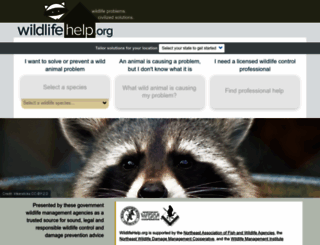WildlifeHelp.org | Wildlife problems. Civilized solutions.
Page Load Speed
436 ms in total
First Response
60 ms
Resources Loaded
235 ms
Page Rendered
141 ms

About Website
Visit wildlifehelp.org now to see the best up-to-date Wildlife Help content for United States and also check out these interesting facts you probably never knew about wildlifehelp.org
Help for nuisance, injured, or orphaned wild animals. Presented by government wildlife management agencies as a trusted source for sound, legal and responsible wildlife control and damage prevention a...
Visit wildlifehelp.orgKey Findings
We analyzed Wildlifehelp.org page load time and found that the first response time was 60 ms and then it took 376 ms to load all DOM resources and completely render a web page. This is an excellent result, as only 5% of websites can load faster.